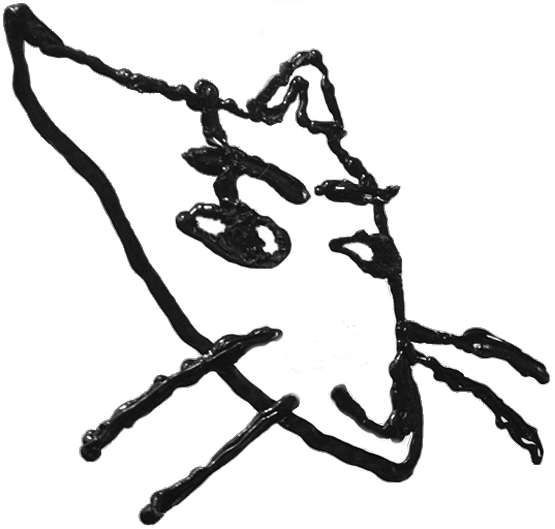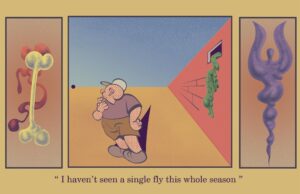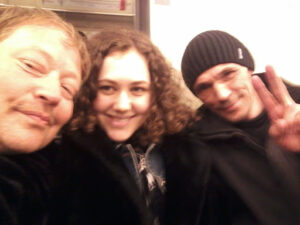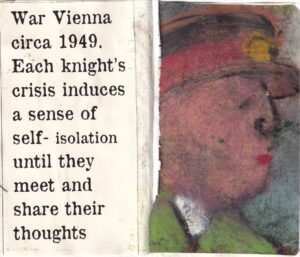And we, who think of joy
as ascending, would feel an emotion,
akin to dismay,
when a joyful thing falls.
-Rilke
It recently occurred to me, given the fullness of my Lebenswelt, as the Germans put it, that some of my happiest moments are the few times a week when I sit before a bagel. It is of course not as simple as that. Obviously my wife, my kids, my instruments etc. are the bedrock beneath me, without which the bagel would be mere sustenance, if even that. It’s a very delicate arrangement. Hegel once bitingly said, “We can measure the loss of spirit by noting how little it takes to suffice.” With that in mind, it still seems true that I have underestimated this moment throughout my life. The Bagel is cut open. Its two circles sit side by side before me like the symbol of infinity.
I want to say a little something before lunch—a grace of sorts. How shall I begin? It’s like the first bite of a bagel: the roundness offers no obvious beginning, you have to just take a plunge. I have in mind to begin like this, echoing a bit of famous Russian bullshit (why not? The bagel is of Eastern European origin, after all):
All shitty bagels are alike, but the wonderful ones are wonderful in their own way.
Anna Karenina is perhaps my favorite book, but I hate the opening sentiment, which simply plays on ressentiment. Unhappiness is the general tenor of life, so it’s actually less interesting and far more banal than its opposite. I’ve had two families now, in my time, and I can say with certainty that the happy one is more interesting. But this isn’t about families or Tolstoy. It’s about how to eat a Bagel.
What Tolstoy means, of course, is that joy and sadness are wrapped up together. To have only one half of the spectrum isn’t possible. To be happy without sadness is neurotic, or cloying. To feel joy without a wisp of its haunting loss is mere kitsch. But one-sided sadness is no better than single-sided happiness. The Bagel before me is infinite-sided, 2πr, it is anything but simple or one sided. Could it be that there is an almost Hegelian logic in my bagel? The mind of god before the creation of lunch?
The best bagel in the world is in Brooklyn. I won’t tell you where for obvious reasons. Even mediocre places are ruined by some idiot ranking the best X. I also respect anyone’s taste. Enjoying a shitty bagel is everyone’s right and even though the best bagel is in Park Slope (one of worst neighborhoods for food in general), I still don’t often make the schlepp for one. I won’t get on a subway even for the very best of something. I am more humble than that. Or lazier. Oftentimes there is no difference.
We have a word in my house for a complex culinary experience. I coined the term, actually. It might also be only me who uses it routinely to express my actual experience. I think the others in my family just use it to refer to why their father is weeping over his egg sandwich. The word is Essenschaden and it means the sadness that one feels when something delicious has been eaten and concluded.
For years I looked for a diagnosis for the intense experience I have that doesn’t seem too widely shared. I read Freud’s Mourning and Melancholia for insight, but only got confirmation that, as a general mourner, I was probably on the right track. Essenschaden for me is not acute melancholia, but more like a chronic but healthy awareness of loss. Like most people, I’ve self-help-googled questions of mental health like: “Why do I mourn when my lunch is over?” All you learn from such a Google search is that others do indeed feel Essenschaden, but no one is recognizing it as particularly profound, troubling or pathological. No one else has even named it.
I think this must be because it’s a very temporary phenomenon. I’ve never heard of a case that extended longer than a day or two and usually it’s just an hour. It varies only by how intense that hour is. It’s true, I have memories of meals so wonderful that I can almost summon a bygone Essenschaden. I had a near fatal case of it once in Ubatuba, Brazil when we stopped at a Sicilian restaurant.
We ate like the Italians in La Grande Bouffe, eating as if we were going extinct. If I had been alone and hadn’t needed to drive my family on to São Paulo I might have opted to live in Ubatuba and eaten myself to death there. Even now, I can remember the Essenschaden that I know my family also felt. We didn’t know going in that it was never going to be that good again. I’m not sure if they would agree. But that’s the thing with Essenschaden—it’s an intensely personal affair. It doesn’t matter what someone else thinks or feels. Essenschaden is something every human faces alone, if they face it at all.
It is also something you cannot fully remember or convey. It is as existential as it is temporal. I know I had a bad case of it in Ubatuba but I can no longer summon it whole; only empty words that fail, like even the choicest description of the rigatoni al ragù at Frank or the rasam from my mother-in-law’s kitchen. The words reveal only the footprints of escape.
The table this morning is set with a buttered Bagel, lightly toasted and buttered, still warm. I am filled with anticipation, but I am also preoccupied with the forethought of grief: this bagel will soon be gone. “You can’t have your bagel and eat it too” the cliche goes. Like all cliches, it’s designed to simply dismiss a problem, prematurely and unthinkingly.
As a last little order of business let me say, some people will just want a naturalistic explanation for Essenschaden, blood sugar or what have you, like my son Akash for whom eating is just a necessity he would prefer to be free from. If such an explanation would satisfy you, I don’t know what to say. I feed Akash bagels when he’s not looking and he eats them automatically. I want better for him, but this is how we keep him alive.
***
Last week I employed a strategy. I ate half of my bagel in the blink of an eye—the way I’ve eaten most of my life: unconsciously, ravenously, carelessly. “Slow down,” I thought, and so I did. I slowed my pace in half and then, half again. I thought of Zeno’s paradox. Theoretically, I would never be done with this bagel and could eat it forever. It occurred to me then, that it doesn’t really require Newton to disprove this ridiculous idea. At some point, near at hand, only a crumb remains which can’t even be savored whole, let alone halved. The bagel becomes indistinguishable from nothing, a vanishing infinitesimal. I hear the distant “ahem” from the ghost of Berkeley.
The bagel and my pleasure enacts the integral calculus all by itself (which, curiously, you would need if you wanted to figure out the area of a bagel). I think about the production of knowledge and the subterfuge the mind resorts to when confronting a problem. But I am not interested in all that, I am interested not in knowledge of the bagel but how best to eat it, which is a function of life.
Epistemology has no hold over me anymore; it is a young person’s party game at a really pretentious party. As Abraham Joshua Heschel wrote, “man will not perish from lack of information, but from too little appreciation.” Heschel was a great eater of bagels, except at Passover, which is chiefly where we differ. Here’s the first point: appreciate the bagel. The Bagel is not a metaphor.
The first written records of the bagel date to the year 1610. They showed up in the community regulations of the Polish city of Krakow, which dictated that bagels were to be given as a gift to women after childbirth. There’s a lot to unpack in that.
There’s a famous essay by Isiah Berlin, everybody knows it, The Hedgehog and the Fox. The idea is that a hedgehog supposedly knows one thing deeply, while the fox knows many things. The reality is neither of them knows anything. Berlin prefers the hedgehog, even though he, himself, is definitely a fox. The idea that you can be one or the other is a little like our idea above about kitsch. They go together, which is kind of the belabored point Berlin is actually making in the essay. Tolstoy, according to Berlin, is a foxy hedgehog. I introduce this so as to say I’m not hypostatizing the bagel. I’m not trying to be hedgehoggy about it.
For me the bagel isn’t one big thing. It’s a ring of dough, circumscribing nothing. There is a Heidegarian take on that ‘Nothing’—or Nichts as the Germans say—at the center. I’ll spare you. Heidegger would make the bagel one big thing if he had Essenschaden and a sense of humor. What I’m driving at here is that nothingness and loss inform our experience of everything significant and the Bagel is a very good exemplar because it has this element intrinsically and graphically baked into it.
As bagels began expanding, literally, in the vicious NYC competition, some got so big that the hole began disappearing. Bagels in NYC are now often obese little spheres with no philosophical depth. I’m against this. But anyway, here’s the point: neither a hedgehog nor a fox appreciates a bagel (at least, this is my belief). I suppose this is why Hegel has no patience for animals in general—he considers their eating habits to be schlechte Unendlichkeit.
Let’s talk a little about Hegel before lunch. Hegel has one really big idea; he’s the ultimate hedgehog. But he’s also quite foxy: he sees his big idea everywhere, which is how he is able to write such large books. If I had an idea as good as his, I’d want to see it everywhere too. I’m going to share the inner essence of Hegel with you.
Early in his Science of Logic, Hegel talks about two infinities, which he calls, somewhat limply, “the good infinite” (wahrhafte Unendlichkeit) and the “bad infinite” (schlechte Unendlichkeit). I’m often asked why I bring Hegel into everything. I swear it’s just a coincidence that the only thing Hegel rhymes with is Bagel. It really didn’t occur to me until now although it’s probably the first thing all young Hegel scholars figure out. (I feel quite sheepish about this but at least I’m not talking about Bagels and Locke.)
For Hegel, the bad infinity is the infinity of mathematics: N+1 (not the literary journal. I’m talking about counting). You can count forever. There is no way-station in the number line, but just an unending sameness or continuum. This common conception of infinity is, to use Hegel’s colorful language, “bad.” Try counting to a million to get the feel of it. According to Google, it will take 11 days, 13 hours, 46 minutes if you don’t take a bagel break. Go on. I’ll wait.
The good infinity is that wherein something is complete in every moment of its being—to use a bad enlightenment expression, it is “autonomous.” Instead of counting from 1 to 2 and then on to 3, the good infinity is a self-fulfilling movement. I suppose if you were counting for pleasure, and not for function, like The Count on Sesame Street, this point would not hold, but very few outside of a muppet can achieve this. Hegel buttresses his point with a great deal of metaphysics, and nothing is less metaphysical than a bagel, so let’s leave it in the bag for now. Aristotle actually has a similar, but simpler, way of saying the same thing.
Aristotle writes about kinesis and energeia, which roughly transpose to the Hegelian concepts. Kinesis (movement) for Aristotle is like N+1. When we walk somewhere, we’re moving from point A to point B. B contradicts or negates A. The movement from A to B has no intrinsic, immanent meaning; it’s merely instrumental. Its meaning lies outside of itself, and by that I mean the purpose of kinesis is in the getting to point B; the result isn’t within kinetics itself. But here’s Aristotle’s beautiful idea. There’s another kind of activity, a higher form that he calls energeia. If we go for a stroll, especially with a good friend, then the activity is complete in each of its moments and its value does not lie outside of itself. We don’t stroll to get from A to B; even if there is an A and B, we stroll to share a pleasant moment. Strolling is energeia. If you’re very, very upset when you’ve strolled with a friend “to get some key lime pie,” and the pie place is closed, you should perhaps re-examine that friendship and consider strolling next time with only a piece of pie instead.
Let’s wrap this up before my bagel gets cold. Hegel calls his good infinity a circle, and a bagel is also a circle: the end is just another beginning. You can’t find the end of a circle, but you can wrap up a bagel, and therein lies a clue to the whole terrible issue of Essenschaden.
So that’s why Hegel criticizes animals, because they take an object and merely consume it. Bear sees bagel, bear eats it. (Schlechter Bär!) But what’s bad about that? I see bagel, I eat it; or at least that’s what I used to do. Now I also mourn its passing while I eat.
It’s said that we’re called human because we bury our dead (the name ‘human’ is related to humus which means earth) and burying is part of mourning. We are distinct from other animals in the degree to which we do this sort of thing. We are also distinct in that we cook our food and bake bagels, which is one of these amazing things that we take for granted, but shouldn’t. It was only in 1264 that Polish Prince Boleslaw determined that “Jews may freely buy, sell and touch bread products like Christians.” My ancestors couldn’t even touch bagels (if they existed) before 1264 AD! What is it in a Bagel that would make someone think they cannot even be touched by Jews? Yes, there is something important in a bagel. It reminds me suddenly of the Nazi jurist Carl Schmitt.
Schmitt wrote, “Tell me who your enemy is and I’ll tell you who you are.” It’s often repeated as if it says something really profound, and it makes sense in the context of wondering about the banning of Jews from bagels. Schmitt was a Nazi, after all. But I’m not sure why we repeat this line. More true would be: “Tell me what astonishes you and I’ll tell you who you are.” Most people have forgotten to be astonished.
So many have forgotten how to love what is before us. Perhaps this is because we must inevitably mourn when we love. Pain, as Queen Elizabeth once said, startling the kingdom with sudden and piercing eloquence, is the price of love.
I just thought of something now that feels too important to let slip: one last sacred cow to secularize before lunch.
One of the most famous discussions of love in the Western canon is Plato’s Symposium. I’m sure you know it: a bunch of Greek men get together in the evening to pay tribute to love as a great god. A lot of wine and speechifying ensues. Aristophanes writes one of the best little tales about the origin of love, which is where the Symposium would have ended if I was Plato’s editor. But it doesn’t end there unfortunately. What follows is Socrates’s idea of love, the most famous definition of love there is. I submit that it is backwards and, well, bullshit. If it was true, Essenschaden would not exist.
The simple point of Socrates’ discussion of Eros, the god of love, is that we don’t actually desire that which we have; we simply desire that which we lack. It’s the teenage-boy version of desire. One might naturally surmise that the source of Essenschaden is precisely because we no longer “have” the desired object. I am no longer in Ubatuba, so my Essenschaden was merely the longing for what was lost. But this is a superficial explanation and it does not describe what I’ve come to understand about love. I do not have a teenage, erotic attraction to the bagel before me.
Plato is of course setting the reader up for the transition from desire for earthly objects to the desire for wisdom. But it’s unnecessary to predicate our desire for wisdom with privation. The one time I acted with something like wisdom, it made me want even more of it, alas.
Also, to take leave of the earth for the transcendental realm seems spectacularly unwise. This is the whole reason for Nietzsche’s hatred of Socrates. My desire for a bagel, like my desire for wisdom, or my desire for my wife, is not extinguished by union with them. It is for this reason that there are at least eight different kinds of love that humans have carefully delineated over the centuries since Socrates. I’m not here suggesting Bagel-Philia is the ninth form.
Love is not an infinite, unending chase of consumption. That would be schlechte Unendlichkeit.
Before eating let’s save love from Socrates’ vulgar proto-capitalist idea. My love, here and now, as I sit down with my bagel is a stroll. It is a consummation of eternity—but, and this is important, in the limited way available to a mere mortal. The experience will end and I will suffer quietly and alone. This is why a god would never experience Essenschaden: they can eat forever.
But it’s also why, in so much literature, the gods seek to become human. Rilke’s angels are always sadly seeking a return to earthliness, to feel the weight of a joyful thing fall, or as they say in Czech, to be freed from “the unbearable lightness of being.” Essenschaden is the reverberation of a meaning meant; a commitment committed. It is the passion play of love. I am soon to be nailed to the cross of my Bagel.
Come with me now through this bagel hole to the end of grace.
In the time leading up to now, there was preparation, kinetic motion—it was all movement towards. Now I cut the bagel. Now I toast it. I turn off all my devices and light a candle. I notice the clock ticking away in anticipation, passing like poppy seeds in an hourglass, the oven running its predictable, instrumental course. Waiting makes pleasure great. This is a Sabbath, of sorts. Am I overdoing it?
“We can measure the spirit’s loss by how little it takes to suffice.” Shut up Hegel. “Baruch atah homotze lechem min haaretz.” Why am I going Jewish? I consecrate this short time I have with you. You lend this time its beneficence. Grief is before me, because I know this time will end, but while it flows, it is exactly what I should be doing. Baruch Atah…I will mourn your loss, but I know the baker plans to make another bagel.
A new time has come. Not a time that is marked on a clock, even though it happens to be 3 a.m. Clock time is schlechte Unendlichkeit. No, we have entered another kind of time, a moment of indwelling spirit, a time complete in every moment of its being. The Essenschaden I feel when I’m done will be the reverberation of this perfect moment transiting time itself; transitioning from one time to another, spirit time to clock time, energeia to kinesis, the good infinity to bad. The bagel and my Essenschaden are the smallest circle of spiritual completeness, reduced to a moment that anyone could fully appreciate. We don’t need to be truffle-hunters of the spirit. We will not perish for lack of information, but for lack of appreciation. It’s time to eat infinity. It’s bagel time.
Amen




